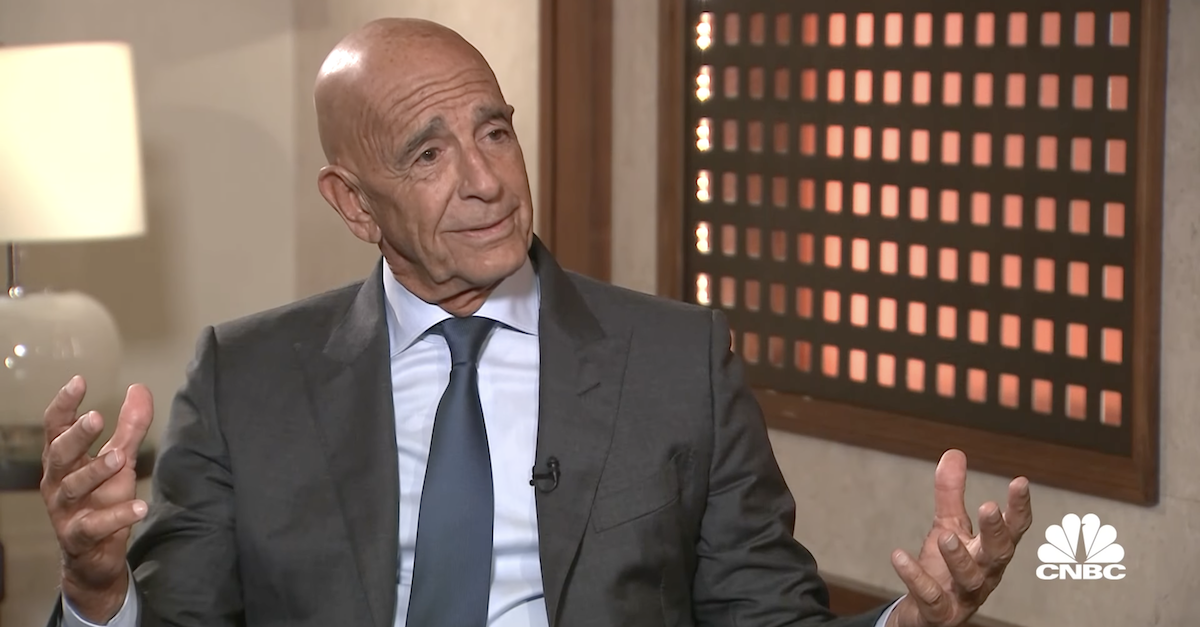
Tom Barrack (screenshot from CNBC International TV YouTube)
Jurors in next week’s trial of Trump ally Thomas Barrack won’t hear of his vast wealth and affluent lifestyle after a judge on Tuesday granted a request from the billionaire’s lawyers, who said the information would create “a substantial risk of class bias.”
Senior U.S. District Judge Brian M. Cogan in the Eastern District of New York said the photos prosecutors want to use as evidence offer “little if any probative value” but bring a “high potential for unfair prejudice” to the case, in which Barrack is accused of trying to secretly peddle influence for the United Arab Emirates in violation of federal lobby laws that required him to register as a foreign agent.
“The Government has overreached here and should not do it again,” Cogan wrote.
Prosecutors filed the proposed exhibits under seal, but they appear to relate three properties owned by Barrack as well as his private airplane, which his lawyers wrote in their motion are not alleged to have been “purchased with the proceeds of his supposed agency” involving the UAE.
Barrack, a senior campaign adviser for Trump and chairman of his Inaugural Committee, is a real estate investor who is founder and executive chairman of the publicly traded Colony Capital. His lawyers referenced “widespread, bipartisan condemnation for CEO compensation in the U.S.” in their motion to bar prosecutors from referencing his wealth.
“Since Mr. Barrack’s compensation is neither an element nor an argument in this case, it would be misleading and confusing to present the jury with evidence of Mr.
Barrack’s wealth, spending, or lifestyle,” according to the Sept. 6 motion from Michael Schachter, a partner with Willkie Farr & Gallagher LLP in New York.
The judge’s order quotes from the sealed version of Barrack’s motion: “As Barrack notes, ‘[t]he jury will be familiar with the concept that people live in houses and sometimes throw parties at those houses, to which visitors are invited.’ Therefore, ‘[t]here is no need to parade in front of the jurors a photograph of [] Barrack’s exact home.’”
Cogan also said prosecutors have “alternative, less prejudicial means for establishing venue and the plane’s connection to Barrack.”
The ruling is among three the judge included in his seven-page order. He first denied as moot a motion from Barrack, 75, and his co-defendant Matthew Grimes, 28, to bar prosecutors from telling jurors that a third co-defendant, Rashid Sultan Rashid Al Malik Alshahhi, is a fugitive, because he said prosecutors don’t plan “to argue that Al Malik’s flight is evidence of his guilt or defendants’ guilt.”
Prosecutors plan to show jurors U.S. Customs and Border Protection records of Al Malik’s travel in and out of the United States, which will include his ultimate departure in April 2018. Judge Cogan said they must focus, however, not on Al Malik fleeing the U.S. but on him being in the country during the time periods relevant in his indictment.
Cogan also denied Barrack and Grimes’ motion to exclude testimony from Michael Higgins, described by prosecutors as “a former member of the United States intelligence community with expertise in intelligence gathering and counterintelligence operations,” and he preliminarily denied their motion to exclude testimony from Christopher Davidson, a former professor at Durham University in England, regarding the history and future of Saudi Arabia.
Higgins’ testimony “will be offered as evidence of the common practices and operations of foreign intelligence services, which will be helpful to the jurors in understanding the evidence,” the judge wrote. Davidson’s testimony will be allowed so long as prosecutors provide “sufficient factual foundation” to show coordination between Saudi Arabia and the UAE is relevant to Barrack and Grimes’ alleged crimes. The judge said Davidson is expected to testify that the proposed release of “Declassified Pages” by Barrack on behalf of the UAE was a significant foreign policy issue of concern to both countries.
“The probative value of this testimony is clear, as it provides context regarding the interests and motivations of the UAE in the release of the Declassified Page,” Cogan wrote. The judge also dismissed concerns that Davidson’s description of the countries as “authoritarian” would be prejudicial, saying that the “testimony is relevant to explaining how defendants may have acted as agents of the UAE and the alleged interrelatedness of the UAE’s and [Saudi Arabia]’s foreign policy interests.”
“In sum, Davidson’s testimony – which will elucidate subjects that would be difficult to understand without expert assistance – is not bad acts testimony, and its probative value – assuming that the Government provides a factual predicate for establishing relevance – is not outweighed by the risk of prejudice,” according to the order.
Jury selection is scheduled to begin Monday at the federal courthouse in Brooklyn.
Judge Corban last month rejected Barrack’s request to shed his GPS ankle monitor, writing: “The risk of flight is not small in this case.”
Read the judge’s new order here: